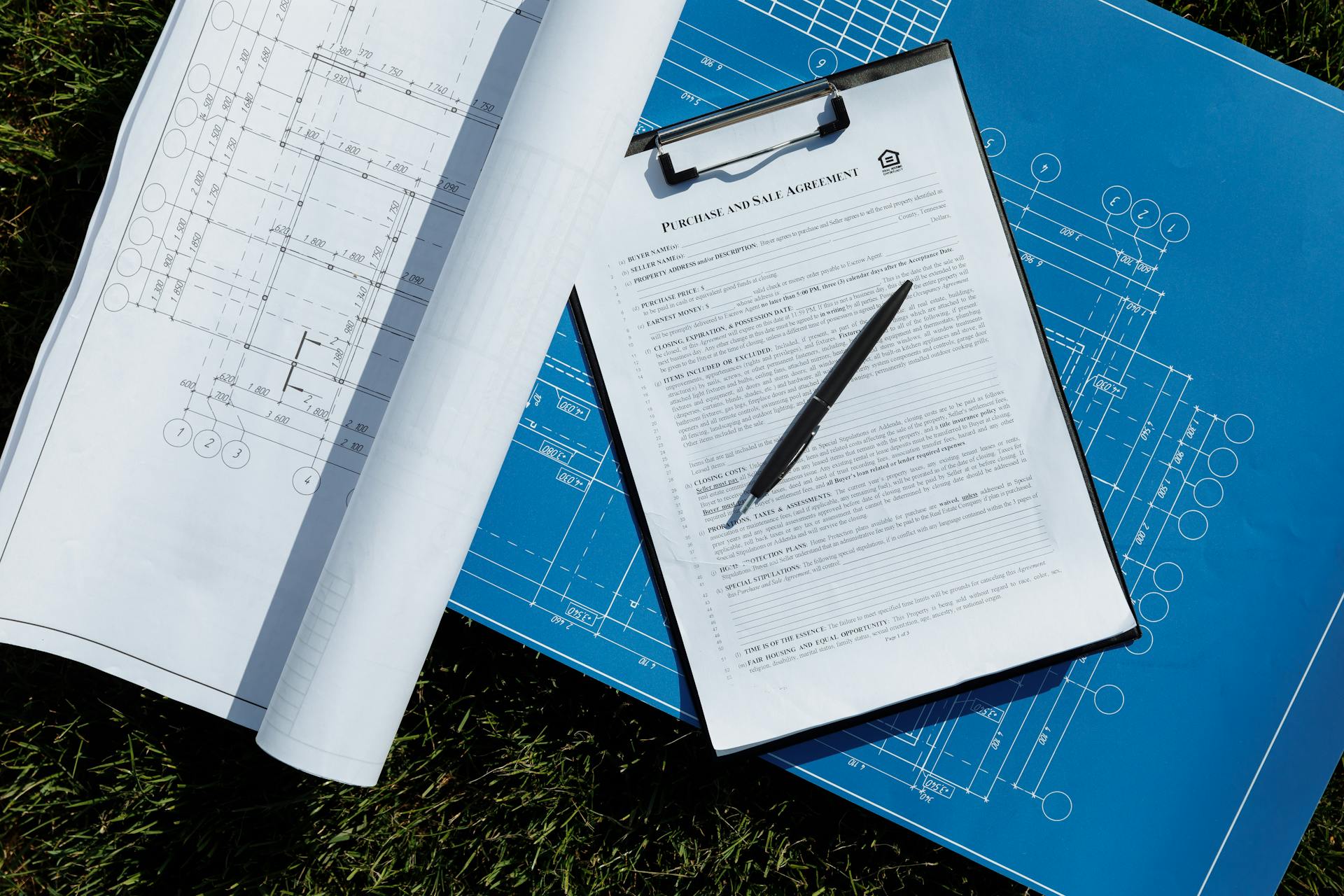
Creating a debt resolution agreement can be a daunting task, but with the right guidance, you can navigate the process with ease.
A debt resolution agreement is a formal contract between you and your creditor that outlines the terms of a settlement.
To start, you'll need to gather all relevant information about your debt, including the amount owed, interest rate, and payment history.
You'll also need to determine a lump sum payment or a series of payments that you can afford to make towards your debt.
DIY Debt Resolution
DIY debt resolution can be a viable option for those who are willing to put in the time and effort. It can take as long as three to four years to complete, according to the National Foundation for Credit Counseling.
You can save on fees by doing it yourself, which can range from 15% to 25% of the settled amount. For example, if you're settling a $10,000 debt for $5,000, you could be hit with a fee as high as $1,250 or more.
However, navigating the process can be tricky, and creditors may try to pressure you into paying the full amount. Experienced debt settlement companies can provide a forcefield against intimidation tactics, enabling them to negotiate a settlement that results in real savings and an opportunity to start fresh.
Here are some benefits of DIY debt settlement:
- Save on fees
- Retain personal control over the timing of the process
DIY vs. Companies
DIY debt settlement is a viable option, but it requires time, effort, and determination. You can settle debts in as little as six months, but it's essential to be committed and disciplined.
The main distinction between DIY debt settlement and working with a company is the cost. With a company, you'll likely pay a fee of 15% to 25% of the enrolled debt, plus setup and monthly fees.
Debt settlement companies can have inconsistent success rates, and some may even fail to settle any debt for a significant portion of their clients. In 2013, the CFPB took action against American Debt Settlement Solutions for failing to settle any debt for 89% of its clients.
Intriguing read: Debt Settlement and Credit
On the other hand, DIY debt settlement avoids the fees associated with working with a company. You can save money by negotiating with creditors on your own, but it's essential to be aware of the risks involved.
Here are some key differences between DIY debt settlement and working with a company:
Ultimately, DIY debt settlement requires a significant amount of time and effort, but it can be a cost-effective option for those who are committed to negotiating with creditors on their own.
Downsides of DIY
DIY debt resolution can be a complex and time-consuming process. You may face a tax burden if you reach a settlement, as you'll likely pay income taxes on the forgiven amount if it's at least $600.
Your credit score will take a hit, and the settlement will remain on your credit report for seven years.
You'll be on your own if you decide to DIY, without a debt settlement professional to negotiate on your behalf.
You might enjoy: Debt Settlement
Cons of
DIY Debt Resolution can be a daunting task, and it's essential to consider the potential downsides before diving in. You may face a tax burden if you reach a settlement, as you'll likely pay income taxes on the forgiven amount if at least $600 in debt is forgiven.
Credit scores can take a hit, and the settlement will remain on your credit report for seven years. This can make it more difficult to get credit or good interest rates in the future.
The DIY process can be time-consuming, and you'll be on your own without a debt settlement professional to negotiate on your behalf. This means you'll have to handle all the communication with creditors.
Here are some potential risks to consider:
- You must be patient, as the process of funding an escrow account can take 36-48 months.
- You must be thick-skinned, as creditors will continue to attempt to collect the outstanding debt.
- There are no guarantees creditors will accept anything less than full payment.
- Some portion of your escrow account will pay for the debt settlement company's services, which can be up to several thousand dollars.
- You risk being sued for repayment before you can make a lump-sum offer, and in some cases, creditors may be empowered to garnish your wages or put a lien on your home.
In addition, settling a debt can have tax consequences, such as paying income taxes on the forgiven amount. This can be a significant burden, especially if you're already struggling with debt.
Preferential Payments
Preferential Payments can be a complicated issue when it comes to DIY debt resolution. You need to be careful about what you do next if not all of your creditors agree to a full and final settlement offer.
If you pay the creditors that have agreed to your full and final offer but you are still left with a large amount of debt because others haven’t, you may need to consider another debt solution.
You should think about whether other debt solutions may be better before you make a payment. Any previous payments you have made to creditors will be looked at if you decide to use an insolvency solution.
If you have made full and final payments to only some of your creditors, it may be argued that this is a preferential payment and you have not dealt with your debts fairly. You should be aware of this possibility before making any payments.
Related reading: What Not to Say to Debt Collectors
A payment made by a friend or relative using their own money would not normally be classed as a preferential payment. This is a good option to consider if you are worried about making a preferential payment.
If you are worried that a payment you are going to make could be a preferential payment, or think that a payment you have already made was preferential and want to apply for insolvency, it's a good idea to contact a professional for advice.
Here are some examples of when a payment might be considered a preferential payment:
- Paying only some of your creditors a full and final settlement offer.
- Making a payment to a creditor who has not agreed to a full and final settlement offer.
Eligibility and Preparation
If you're considering DIY debt settlement, you need to determine if you're a good candidate. Answer these questions: have you considered bankruptcy or credit counseling, which can resolve debt with less risk and faster recovery? Are your debts already delinquent, typically after 90 days?
You'll also need to have the money to settle, as creditors will want a lump-sum payment or a payment plan. Some creditors will accept payment plans, but you need to have the cash to back up any settlement agreement. Confidence is key to DIY debt settlement, so if you believe you can negotiate, you probably can.
Typically, credit cards and medical bills are ideal for debt settlement, but federal student loan balances are highly resistant to debt settlement schemes. If you have defaulted on a federal student loan, you may be able to settle for one of three conditions: paying the balance and interest, paying the principal plus half the unpaid interest, or paying 90% of the remaining principal and interest.
Here are the types of debts eligible for settlement:
- Credit cards
- Medical bills
- Private student loans
Am I Eligible?
You're wondering if you're eligible for debt settlement? Let's take a closer look. Credit cards and medical bills are ideal for debt settlement, as they're often more forgiving than other types of debt.
To be eligible, you typically need to have debts that are at least 90 days delinquent. Many creditors won't consider settlement until your debts are this far behind. Some creditors may even sell your debt to a third-party debt collector after 120 to 180 days of delinquency.

You'll also need to have the money to settle your debts. Some creditors will want a lump-sum payment, while others will accept payment plans. You'll need to have the cash to back up any settlement agreement.
Federal student loan balances are highly resistant to debt settlement schemes. However, private student loans, usually issued by banks, are a better target for debt settlement than federal student loans.
Here are some conditions under which you might be eligible for debt settlement with federal student loans:
- You pay the balance of the loan and interest, but not the collection agency charge.
- You pay the principal plus half the unpaid interest.
- You pay 90% of the remaining principal and interest.
Keep in mind that confidence is key to DIY debt settlement. If you believe you can negotiate with your creditors, you probably can.
How to Prepare
To prepare for debt settlement, you'll need to make monthly deposits into an escrow account. This account will be in your name and insured by the Federal Deposit Insurance Corporation (FDIC).
The total amount you need to save will depend on your budget and the amount you're trying to resolve. Your settlement company will tell you how much to save, and you can expect to make payments for several months to a few years.

It's essential to review your situation and make a list of everything you owe, including creditors, types of debt, and the total amount owing. This will help you understand your financial situation and determine how much you can afford to pay.
You should also review your monthly budget to see how much you can afford to pay towards debt settlement. This will help you establish whether you can make a large lump-sum payment and how much.
Here are some key factors to consider when preparing for debt settlement:
- Credit cards and medical bills are ideal for debt settlement.
- Federal student loan balances are highly resistant to debt settlement schemes.
- Private student loans, on the other hand, are a better target for debt settlement than federal student loans.
Remember to contact your creditor(s) and have hard numbers ready, and be sure to try to start low before agreeing to an amount.
Debt Settlement Process
The debt settlement process can be a bit complex, but it's definitely doable with the right approach.
Debt settlement companies, especially those associated with the American Fair Credit Council, have a track record of helping clients save money on their debts. On average, they provide $2.64 in consumer savings for every $1 in assessed fees.
The longer you participate in a debt settlement program, the more savings you're likely to see. In fact, three out of four debt settlement clients settle at least one account within the first four to six months after enrollment.
If you're considering going the DIY route, it's essential to dig into your debts and assess your financial situation. You'll want to determine how much you owe, who the creditors are, and whether it's possible to pay off the debts without a settlement agreement.
To negotiate with creditors, it's a good idea to stash some cash and be prepared to make a lump-sum payment or monthly payments. Typically, a creditor will agree to accept 40% to 50% of the debt you owe, although it could be as much as 80%.
Here's a rough idea of what you can expect in terms of debt reduction:
- Average client reduced total debt of approximately $30,000 to $35,000 at the time of settlement.
- Approximately $9,500 in savings after deducting fees.
Remember, the key to a successful debt settlement is to be committed, disciplined, and experienced at driving a hard bargain. Without these qualities, you may end up paying the full tab.
Debt Settlement Options
You can settle most debts for less than what's owed, especially those held by debt collection agencies. The goal of debt settlement is to pay less than you owe, and it's possible to save thousands of dollars in the process.
Debt settlement companies can help you achieve this, but it's also possible to do it yourself. However, running the program yourself can be a huge risk, as creditors often know how to pressure self-represented consumers into paying the full tab.
Proven debt settlement companies have experience and expertise that can provide a forcefield against intimidation tactics, enabling them to negotiate a settlement that results in real savings and a fresh start.
Here are some general guidelines for making an offer:
Debt settlement can result in significant savings, with an average of $2.64 in consumer savings for every $1 in assessed fees.
Alternatives
Debt settlement can be a viable option, but it's essential to consider the pros and cons before making a decision. Debt settlement comes at a cost, both financially and emotionally, and there are no guarantees of success.
You might be surprised to learn that debt settlement can actually be the cheapest option when compared to credit counseling or debt management, and making minimum monthly payments. This is especially true if you're able to negotiate a settlement that's significantly lower than the total amount owed.
If you're considering debt settlement, you'll likely want to know that it can provide a fresh start for your financial life. With debt settlement, you'll have a chance to start over and rebuild your financial stability. However, it's crucial to remember that debt settlement can be a high-wire act, requiring you to navigate complex financial situations.
Here are some alternatives to debt settlement that you might want to consider:
- DIY Debt Settlement
- Credit Counseling
- Debt Management
- Debt Consolidation
- Bankruptcy
These alternatives can help you tackle your debt in different ways, and it's worth exploring each option to see which one is right for you. Credit counseling and debt management, for example, can provide you with professional guidance and support to help you manage your debt. Debt consolidation can help you combine multiple debts into a single, more manageable loan. And if all else fails, bankruptcy might be an option to consider.
A fresh viewpoint: Credit Debt Resolution
Pros
Debt settlement can be a game-changer for people struggling with debt. Here are some of the key benefits:
You'll be able to erase your debts at something less than the total owed, which is a huge weight off your shoulders.
Debt settlement could be the cheapest option when weighed against credit counseling/debt management and making minimum monthly payments, saving you money in the long run.
After a successful debt settlement, you'll have a fresh start for your financial life, free from the burden of debt.
If you're successful, you won't be sued for collection of your debt, and you'll avoid wage garnishments, which can be a huge relief.
You'll also avoid potential bankruptcy, which can have long-term consequences on your credit score and financial stability.
Here are some key statistics on debt settlement:
- Debt settlement provided, on average, $2.64 in consumer savings for every $1 in assessed fees.
- Nearly all offered settlements — more than 98% — resulted in a decrease of the client’s debt greater than the accompanying fees.
- The longer clients participate in a debt settlement program, the more savings they see, on average.
- Three out of four debt settlement clients settle at least one account within the first four to six months after enrollment.
- The average client reduced total debt of approximately $30,000 to $35,000 at the time of settlement, by approximately $9,500 after deducting fees.
Settlement Percentage
Debt settlement can be a complex process, but understanding the settlement percentage can help you navigate it more effectively.
A common starting point for debt settlement negotiations is to offer a lump sum of 25% or 30% of your outstanding balance in exchange for debt forgiveness. Expect the creditor to counter with a request for a greater amount.
The actual settlement percentage can vary widely, with creditors sometimes accepting as little as 40% to 50% of the debt owed, while in other cases, they may demand up to 80%.
It's essential to remember that debt settlement companies can help you negotiate a better settlement percentage, and their experience and expertise can provide a forcefield against intimidation tactics.
Here's a rough idea of what you might expect in terms of settlement percentages:
Keep in mind that these are general guidelines, and the actual settlement percentage will depend on the specifics of your situation.
Sources
- https://www.nerdwallet.com/article/loans/personal-loans/debt-settlement-negotiations
- https://www.debt.org/settlement/
- https://www.investopedia.com/articles/pf/09/debt-settlement.asp
- https://nationaldebtline.org/get-information/guides/full-and-final-settlement-offers-ew/
- https://www.forbes.com/advisor/debt-relief/debt-settlement-negotiations-diy/
Featured Images: pexels.com


